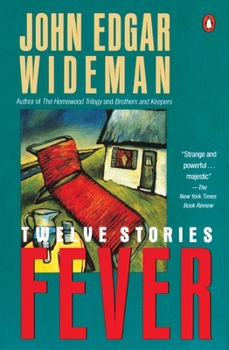Fever
Select Format
Select Condition 
Book Overview
By turns subtle and intense, disturbing and elusive, the stories in this collection are ultimately connected by themes of memory and loss, reality and fabrication, and by a richless of language that rests lightly on its carefully foundation.
Format:Paperback
Language:English
ISBN:0140143475
ISBN13:9780140143478
Release Date:October 1990
Publisher:Penguin Books
Length:176 Pages
Weight:0.44 lbs.
Dimensions:0.4" x 5.1" x 7.6"
Customer Reviews
1 rating
Criminally-neglected author, fine book.
Published by Thriftbooks.com User , 23 years ago
Wideman may be the finest American writer no one's ever heard of. Much of his early work has been allowed to run out of print and fade into obscurity; he remains a critical darling, popping up in _The Best American Short Stories_ and editing black-literature anthologies, yet he's never found a popular audience. Which is too bad, because Wideman's got a lot to say.Wideman covers much the same ground as Graham Swift-- the relationships between two human beings, whoever those two human beings may be. Wideman tends a little more towards the family side of things than does Swift, leading to a bit more variation on the theme, but the theme usually stays the same, how relationships end. They do not all end badly, by any means, as they do in Swift and so many other authors. They do not all end within the scope of the stories presented. But hanging over Wideman's work is always the feeling that relationships between people _will_ end, somewhere along the line.As in Swift, though, the similarity of tone and mood to be found in the various stories in this collection don't make it monotonous. Wideman gives us an interesting array of characters to examine, puts them into everyday situations, then throws something into the mix to jazz it up a little-- a blind man who never misses a shot from the free-throw line, a pianist who won't stop describing a dream long enough for his brother to tell him of the death of their mother (because, we can tell, he is already aware), etc. Wideman has a keen ear for the natural flow of language, and it both heightens his dialogue and keeps the descriptive parts of the stories flowing.The one place Wideman does falter is in letting the message override the storytelling in places. The title story in this collection works when Wideman is painting a scene, just as all his other stories work, but every once in a while the agenda gets in the way and the story flattens into polemic. Wideman never, though, allows the polemic to take over completely, and he's always able to successfully pull himself back from the brink. (In his defense, the ending of "Fever" is fantastic, a truly strong piece of writing, that more than makes up for the story's faults.)As with most of the books Wideman published before 1991, this is out of print at present. However, it's worth hunting down. A wonderful introduction to a wonderful author. *** 1/2






